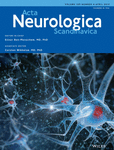Predictors to quality of life improvements after subthalamic stimulation in Parkinson’s disease
Abstract
Introduction
Subthalamic deep brain stimulation (STN DBS) has been reported to improve the quality of life (QoL) related to Parkinson's disease (PD). However, not all subjects are satisfied with the postsurgical QoL outcome. We aimed to detect the related factors and possible predictors to QoL improvement for those PD patients one year after STN DBS.
Materials and Methods
A total of 45 PD patients with bilateral STN DBS surgery were included and followed up for 1 year. The Reliable Change Index (RCI) was adapted to determine the individual postsurgical QoL outcome. The changes of QoL were correlated with baseline parameters and the changes of progression parameters using Pearson's correlation. The exploratory stepwise regressions were adopted to detect the extents of baseline variables and progression parameters. The predictors to QoL outcome were detected using the logistic regression analysis.
Results
A total of 51.1% of the patients reported a better QoL, 40.0% of patients reported an unchanged QoL, while 8.9% of patients reported a worsening of QoL. The subdomains of mobility, activity of daily living, cognition, and bodily discomfort improved significantly after the surgery. The presurgical factors including QoL, dopaminergic medication burden, disease stages, depression scores, and postsurgical reductions in depression and nonmotor scores were found to correlate with QoL changes. Furthermore, the greater presurgical QoL burden, lesser dopaminergic medication exposure, and earlier disease stages were predictors to QoL improvements.
Conclusion
The clinicians should carefully evaluate the nonmotor symptoms and life quality in those patients at relatively earlier stages and with lower medicine dosage to get more successful DBS outcomes.
CONFLICT OF INTEREST
None.




